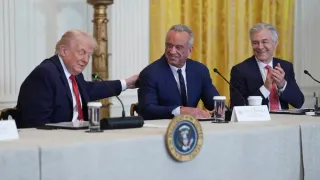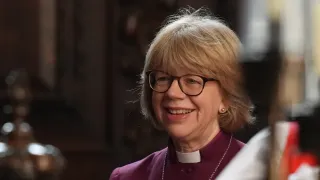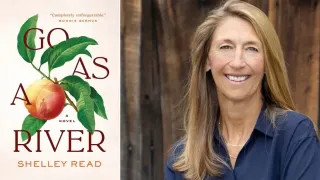October 8, 2016
CA Voters to Take on Guns, Pot
Seth Hemmelgarn READ TIME: 5 MIN.
Two of the propositions that California voters will decide on in November address a couple of the most contentious issues in the country: Guns and marijuana.
Among other provisions, Proposition 63, known as the Safety for All Act of 2016, would establish new procedures for enforcing laws that prohibit felons and violent criminals from possessing firearms, require most ammunition sales be made through licensed vendors and reported to the U.S. Justice Department, and ban the possession of large-capacity ammunition magazines.
Proposition 64 would legalize adult recreational use of marijuana, designate state agencies to license and regulate the marijuana industry, and impose a state excise tax on retail sales equal to 15 percent of the sales price.
Lieutenant Governor Gavin Newsom, San Francisco's former mayor, played a key role in crafting both proposals and met with the Bay Area Reporter's editorial board Friday, September 30 to discuss the measures.
Newsom said he was inspired to act on gun safety after numerous mass shootings in the country.
Even after 20 schoolchildren and six adults were fatally shot at a Newtown, Connecticut elementary school in 2012, he noted, tougher restrictions on guns "didn't happen," and the country saw similar shootings "over and over again."
Finally, he said there was a "crescendo" for him after eight people were killed in a mass shooting in Oregon in 2015.
Newsom remembered President Barack Obama saying, "We are all accountable," and Newsom said, "I was sick and tired of being sick and tired." He recalled thinking, "I can't yell and scream at the TV anymore."
Newsom and Peter Ambler, who works with Gabby Giffords on the gun safety group Americans for Responsible Solutions, examined where the gaps are in current law and focused on several areas. Giffords is the ex-Democratic congresswoman from Arizona who was shot in a 2011 assassination attempt.
The biggest provision in Prop 63 involves relinquishing guns from people who shouldn't have them, Newsom said.
He said that when people get out of jail or prison, "all their weapons are at home." The state may already relinquish weapons from people who are ineligible to possess them, such as those who've been convicted of felonies, but there's "no process" for collecting them, Newsom said.
This would be "a very significant provision," he said. "No other state in the country does this."
Prop 63 also addresses ammunition.
"No state has ever treated ammunition like they do guns," Newsom said. People can buy "unlimited rounds of ammunition online." Additionally, he said, no data is collected and there's no licensing.
He said that after Sacramento officials started tracking ammunition sales, they were able to seize guns from people who weren't supposed to have weapons but were buying ammunition.
"I really believe this is a game changer in the gun safety debate," Newsom said.
The proposition would also ban large-capacity magazines.
"We already did that in San Francisco," Newsom said.
He said polling has shown more than 70 percent support Prop 63, and opposition by the National Rifle Association hasn't diminished his confidence in the measure passing. The NRA is part of the Coalition for Civil Liberties, which also includes the gay guns group the Pink Pistols and has released at least one ad geared specifically toward LGBTs.
"The idea that they give a damn" about LGBTs is "comedic," Newsom said of the NRA.
He predicted the proposition could help take down the group "because the public overwhelmingly supports what we're doing. They can't win with direct democracy." He sees Prop 63 as a chance "to really take them down."
"It's analogous to same-sex marriage," Newsom said, with proponents going from "the bottom up, state by state."
"Where California goes, so goes the nation," he said. "This is raising the bar."
Newsom should know.
In 2004, when he was San Francisco's mayor, he launched what's known as the Winter of Love by ordering city officials to issue marriage licenses to same-sex couples. His actions eventually led to the U.S. Supreme Court ruling in 2015 that same-sex couples should be allowed to marry in every state.
A spokeswoman for the NRA referred a request for comment to the Coalition on Civil Liberties, which didn't respond to emails.
Among other findings, the state Legislative Analyst's Office estimated that "the total magnitude" of state and local court and law enforcement costs from Prop 63 "could be in the tens of millions of dollars annually," but "actual costs would depend on how this measure was implemented."
Proposition 64
Newsom said the process toward Prop 64, which would allow the recreational use of marijuana by adults 21 and older, started several years ago, when people were asking him about his position on legalizing pot.
"I think I support it," he recalls saying, but he realized he needed to learn more about it. He put together a task force that included the Drug Policy Alliance, the American Civil Liberties Union, and others. The group held town hall meetings and eventually generated a report with recommendations for how to address concerns like driving under the influence and advertising to children (which the measure wouldn't allow). Medical use of marijuana is already legal in California.
The LAO estimates that "state and local governments could eventually collect net additional revenues ranging from the high hundreds of millions of dollars to over $1 billion annually. However, the revenues are likely to be significantly lower in the first several years following the passage of the measure."
That's in part because it would take "a couple of years for the state to issue licenses to marijuana businesses."
Despite the potential financial benefits, "this is not about generating revenue," Newsom said, and he doesn't want another Gold Rush.
Sixty percent of the money would go toward children, youth, and families. Newsom sees "flexibility" in this area "for folks to make the case" that the money could be used to address mental health and HIV/AIDS needs.
With the rest of the funds, 20 percent would be for law enforcement, and 20 percent would be used for environmental concerns.
The money for law enforcement would help there be "a shift from going after black and brown kids," to "go after the cartels" instead, Newsom said.
One challenge to legalizing marijuana is how it would be determined that a person is driving under the influence.
But Newsom noted, "We're not introducing something that's not already ubiquitous."
He also addressed the notion that legalizing marijuana would increase use of the drug by referring to a report issued in September by the Cato Institute.
That report points out that recreational use of marijuana has been legalized in Alaska, Colorado, Oregon, and Washington.
"Our conclusion is that state marijuana legalizations have had minimal effect on marijuana use and related outcomes," the report's executive summary says. "... Insufficient time has elapsed since the four initial legalizations to allow strong inference. On the basis of available data, however, we find little support for the stronger claims made by either opponents or advocates of legalization."
Andrew Acosta, a spokesman for the No on Prop 64 campaign, said that among other problems, the measure does not "get it right on DUIs." Although it could "potentially" bring in a lot of money, there could be "unintended consequences."
"California should wait and make sure the other states ahead of us get it right," Acosta said.






